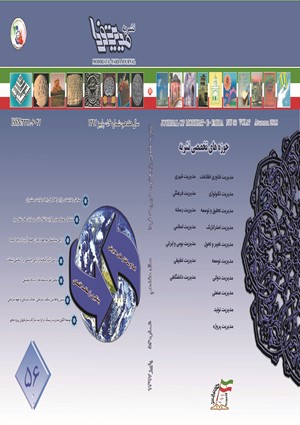کاربست رویکرد مدل¬یابی ساختاری – تفسیری در طراحی مدل فرآیند مدیریت عملکرد کارکنان دانشی شرکت¬های دانش¬¬بنیان
محورهای موضوعی : مدیریت صنعتیمحمدمهدی بیگدلی 1 , مهدی حمزه پور 2
1 - دانشگاه امام صادق علیه السلام
2 - دانشگاه امام صادق علیه السلام
کلید واژه: مدیریت عملکرد, کارکنان دانشی, شرکتهای دانشبنیان, رویکرد مدلیابی ساختاری – تفسیری (ISM),
چکیده مقاله :
امروزه جایگاه شرکتهای دانشبنیان، بهعنوان یکی از ارکان مهم اقتصاد مقاومتی بسیار افزایش یافته است. با توجه به اهمیت بالای توانایی، تخصص و مهارتهای انسانی در این شرکتها، توجه به ویژگیهای ذهنی، احساسی در تعامل ایجادشده با شرکت، مقدمه لازم جهت تحقق اهداف شرکتهای دانشبنیان است. هرچه سطح وابستگی کسب و کار شرکت به کارکنان دانشی بیشتر باشد، مفهوم مدیریت عملکرد پررنگتر خواهد بود. این در حالی است که تاکنون، در حوزه عملکرد کارکنان دانشی، به ارزیابی عملکرد این دسته از کارکنان پرداخته است. از خصوصیات غالب نظامهای ارزیابی عملکرد میتوان نگاه مچگیرانه، پسینی، از بالا به پایین بودن و سطح پایین یکپارچگی و اثربخشی کل سیستم را برشمرد. پژوهش انجامشده از دو مرحله تشکیل شده است. با مطالعات کتابخانهای و بررسی پیشینه پژوهش یک فرآیند مدل هشت مرحلهای مدیریت عملکرد استخراج شد. در گام اول پژوهش پس از مصاحبه با 16 نفر از کارشناسان و خبرگان، با استفاده از روش کیفی تحلیل مضمون، ابعاد (مراحل) فرآیند مدیریت عملکرد کارکنان دانشی موردبررسی و تحلیل قرار گرفت. در گام دوم پژوهش، با استفاده از رویکرد مدلیابی ساختاری – تفسیری (ISM) و بهره گیری ازنظر خبرگان به طراحی مدل فرآیند مدیریت عملکرد کارکنان دانشی در شرکتهای دانشبنیان پرداخته شد.
Today, the role of knowledge-based companies has grown as one of the key pillars of the resistance economy. Considering the importance of the ability, expertise, and skills of these companies, consideration of the mental, emotional, and interactive characteristics of the company is an essential precondition for the realization of the goals in the knowledge-based companies. The higher the degree of affiliation of the company to the knowledge workers, the more meaningful the concept of performance management will be. However, so far, in the field of knowledge workers' performance, it has been evaluating the performance of these categories of employees. The prevailing characteristics of performance evaluation systems can be seen as the tangent, downside, downside and low level of integrity and effectiveness of the entire system. The research is composed of two stages. With a library study and a review of the research background, an eight-stage performance management model process was extracted. In the first step, after interviewing 16 experts , using the qualitative method of the analysis, the dimensions (stages) of the performance management process of knowledge workers were analyzed. In the second step, the research was conducted using the Structural-Interpretative Modeling (ISM) approach and the use of expert judgment to design a model for the performance management process of knowledge workers in knowledgeable Based companies.
